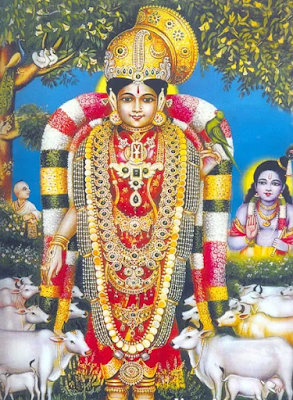The Tirruppavai is one of two volumes of poetry composed by the poet-saint Andal (9th century).
Andal was the only woman among the Alvars, a group of twelve poet-saints who flourished during the seventh and tenth centuries in southern India.
All of the Alvars were Vishnu worshipers (bhakta).
Their focus on fervent devotion (bhakti) to a personal
deity, expressed via Tamil hymns, changed and revived Hindu religious life.
Andal's chosen god was Ranganatha, a manifestation of Vishnu who presides over the Shrirangam temple.
Nonetheless, both of her poetry books are devoted to
Krishna, a different incarnation of Vishnu.
This seeming split might be due to her belief that all
incarnations of Vishnu are ultimately the same, or it could be due to the
distinction between personal devotion and literary expression.
The Nacciyar Tirumoli has thirty poems recited by a group of
unmarried females who had made a pledge to wash in the river at daybreak during
the coldest month of the year.
This oath has a long history in southern India, when young
ladies would swear to find a nice spouse and live happily ever after.
The females in the poem had made a promise to win Krishna as
their spouse.
The cycle's poems depict many aspects of the natural world
at morning, the girls' aspirations for carrying out the pledge, and their
return to Krishna's dwelling to awaken him and ask for his favor.
The concluding poem in the sequence explains the advantages
of chanting the text.
You may also want to read more about Hinduism here.
Be sure to check out my writings on religion here.


